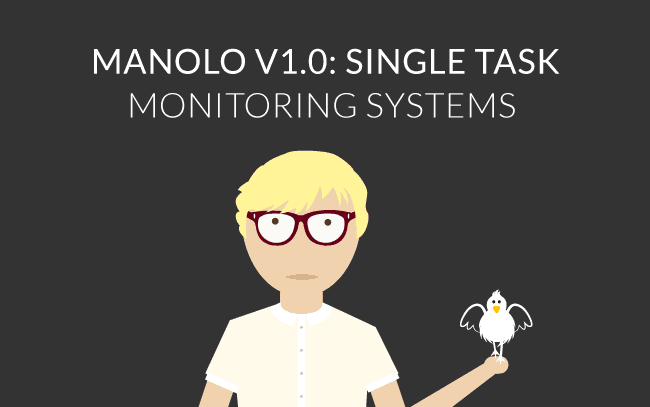In a small provincial building society, the kind that were made extinct by the 2008 financial crash and by bad management, there worked a certain Manolo.
In reality, he was an IBM employee, and he was there for basically two reasons: he was a recent graduate, with good grades and eager to start gaining professional experience…at a rock-bottom salary point. Plus, he lived two doors down from the building society’s CPD.
A match made in heaven.
He soon got the hang of working at the building society, where his tasks were many and diverse – checking that the x86 servers responsible for email were functioning correctly, registering or unsubscribing clients, and also maintaining the servers that handled virtualization. There were, in fact, two of these, but the CPD was only little and there wasn’t much on the x86. He had some networking knowledge, so ended up taking care of them as well, as well as registering new devices and paths.
Slowly but surely, and surrounded by country living technophobes, Manolo became more essential by the day.
He was also the chief go-between when it came to dealing with the city slickers at head office. Security, communications and the office network were all controlled from the Capital of the Kingdom, via the building society’s Mainframe. Whenever a technological intervention was required, there was our humble techno-Stakhanov, telephone hotly pinched between shoulder and ear, slaving deep in the data mines for the greater good.
Sadly, Manolo was not a Stakhanovite automaton and he soon began to dabble in a spot of benign hacking. It’s one thing to attend to an incident during working hours, it’s quite another to be awoken like a detainee at Guantanamo at three o’clock in the morning and dragged like a common refugee across the border of sleep, whenever the ATM network goes down. When it’s the director himself who summons you during the wee small hours to a crisis meeting because he CAN’T OPEN AN EMAIL ATTACHMENT, this, my friend, is the end. Thus began Manolo s slippery slide down the security slide, and he started providing support from home using a remote connection unknown to his fellow workers. He also put in place an OpenSource monitoring system. Without authorization, sure, but it made his life a little easier.
Three years went by. Three harvests were collected in the sleepy Spanish town. Three vintages were ripened, matured and bottled in the strong Castilian sun. Births, deaths, marriages, harvests – the slow, regular rhythms of country life. During this time our hero Manolo attended planning meetings, met with suppliers, but kept no records. The network, services, applications, all were there on the servers, but only Manolo knew them, their location, their installations. No one else was interested in this arcane lore, no one asked and no one authorized.
As you can imagine, this story doesn’t have a happy ending, at least for the client. Like Macbeth, Manolo’s ambition grew. First he desired to formalize his relationship via a legal marriage contract, according to the custom of his people, and also to emancipate himself from his progenitors by becoming a property owner. So he opened negotiations with his boss in Madrid and the answer always came back unaltered: the contract is non negotiable, operational overheads are calculated to the last cent, when the next round of negotiations begins, then maybe…A tiny idea began to grow in Manolo ‘s mind. Not to be the next King of Scotland, but to find a position where his talents would be economically compensated. He started a discreet job hunt, started attending interviews during work hours, and updated his CV with his new skills.
Not long after a new job came his way: more rewarding, more challenging, better paid. Thus began what we might term “The Plumber Effect”. That is, what’s the first thing a plumber says when you call him to your house on Friday afternoon? “Who did this work? What a mess, that’s all going to have to come out”.
Don’t get me wrong, Manolo was a good professional, he just had his own way of doing things. Nor were the employees of the building society. Why should they worry about putting out fires if there weren’t any? IBM had its best practices but it relies on its employees and sub-contractees to carry them out.
When the plumber starts talking like this, you know it’s time to ante up. Want to get to the other side? Pay the ferryman, and shut up.
The moral of this story is valid for most areas of IT, and that’s no different in our own area of expertise: monitoring.
1. If you develop a monitoring system ad hoc, without professional support from the manufacturer, then instead of having a configurable tool you’ve just signed a blank check. Only a single human in the whole wide world is going to be able to disentangle this particular Gordian knot, and they’ve just gone to another company.
2. If the monitoring system you’ve chosen makes it compulsory to install extra software on the servers you need to be 100% certain of what you’re installing. Just as it can extract data it can also input it. Or maybe you didn’t know that in order to extract information from an OS the easiest way is with the administrator’s password?
3. A professional monitoring tool shouldn’t only give you feedback on what’s happening with your network, but also on what has already happened, when it happened and who’s been affected.
4. A tool like Pandora FMS incorporates a knowledge base that gives you info on all the elements that make up your network.
5. As Dr. House says, everybody lies, and the first one to do so is the patient. Are you really going to trust the health and well-being of your network to a ” Manolo “? A monitoring system must incorporate a system of reports that allow you to know all your systems’, applications’ and services’ statuses at any time and preferably at a glance, according to the user profile who is consulting. The manager may not need to know the exact status of the servers but the head of IT would like to get that information, and if it can be sent to a mobile device when the person in question is out of the office, what’s not to like?
Finally, by way of a happy ending, Manolo l is now married, living in the capital, working for a large company and doing a job he enjoys. There’s even a baby on the way, to round out this cozy portrait. Let’s draw the curtain on this uplifting domestic scene, but not before remarking that the only grit in Manolo’s ointment are the occasional but regular phone calls from his old colleagues at the building society asking for “a small favor” when they can’t find a contract for a license, or the support number for a certain piece of hardware, or how to get the director back in to his email account the umpteenth time he forgets his password (hint: it’s “password123”!). Patience, Manolo.
Pandora FMS’s editorial team is made up of a group of writers and IT professionals with one thing in common: their passion for computer system monitoring. Pandora FMS’s editorial team is made up of a group of writers and IT professionals with one thing in common: their passion for computer system monitoring.





















